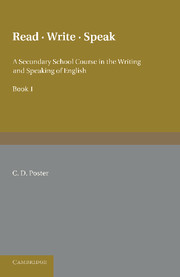Book contents
- Frontmatter
- Acknowledgements
- 1 When I was young
- 2 A Modern Mythology
- 3 The Magic Shop
- 4 Portraits
- 5 The Fair
- 6 Letters
- 7 The Waxworks
- 8 A Matter of Size
- 9 Facts and Figures
- 10 Tall Tales
- 11 Painting with Words
- 12 Telling a Tale
- 13 Brandon
- 14 Seeing and Observing
- 15 In the Dark
- 16 Strange Creatures
- 17 MACHINES
- 18 No Noses
- 19 Diaries
- 20 The Fox's Foray
14 - Seeing and Observing
Published online by Cambridge University Press: 05 June 2016
- Frontmatter
- Acknowledgements
- 1 When I was young
- 2 A Modern Mythology
- 3 The Magic Shop
- 4 Portraits
- 5 The Fair
- 6 Letters
- 7 The Waxworks
- 8 A Matter of Size
- 9 Facts and Figures
- 10 Tall Tales
- 11 Painting with Words
- 12 Telling a Tale
- 13 Brandon
- 14 Seeing and Observing
- 15 In the Dark
- 16 Strange Creatures
- 17 MACHINES
- 18 No Noses
- 19 Diaries
- 20 The Fox's Foray
Summary
I can tell a flycatcher from a sparrow at two hundred yards, although at that distance I can no longer see any difference between their plumage. I have observed that the flycatcher's way of flying is quite distinct, that it favours a particular part of my garden, and that its behaviour is quite recognisably different from that of the sparrow. Ask me, however, what make of car any one of my neighbours or friends runs, and I doubt whether I could give you the correct answer more than once in ten. I see their cars daily, probably more often than I see the flycatchers. Yet, because I have no interest in makes of cars, I fail to observe their shapes.
There are people who go through life seeing, no doubt, as much as you or I do, but observing little or nothing. There are others full of interest in everything that comes before their eyes, who are constantly making discoveries for themselves which are quite as important, to them, as the discoveries of scientists and engineers and explorers that are reported in our newspapers.
Here are some tales about animals that people believed for hundreds of years (indeed, some people still believe some of them) because they saw, but did not observe.
Bear cubs are born shapeless and are licked into shape by the mother bear.
When danger threatens, adders swallow their young.
Swifts and swallows hibernate during the winter at the bottom of ponds.
In September, cuckoos change into sparrow-hawks.
Porcupines cast their quills like spears at an enemy.
What gave rise in each case to these mistaken beliefs? Can you think of a reason why each one has persisted so long?
Because you cannot observe everything for yourselves you must at times take the word of others. You will, I hope, pay most attention to those who have seen for themselves and are not merely relaying to you what someone else has told them long since.
Here, from a book called Nature Detectives, is an account of the behaviour of grey squirrels:
Mr Thornley was staring intently at something higher up in the trees, and following his glance Robert saw something flicking and jerking on a bough. It looked rather like a snake. Suddenly the thing took shape—it was a squirrel, crouching quite still except for its jerking tail. It was staring hard at the drey.
- Type
- Chapter
- Information
- Read Write Speak , pp. 89 - 95Publisher: Cambridge University PressPrint publication year: 2013



